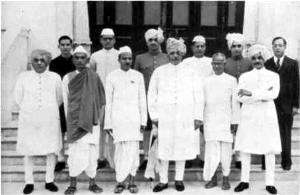U. N. Dhebar
Uchharangrai Navalshankar Dhebar (1905–1977) was an Indian Independence activist who later served as the Chief Minister of Saurashtra State from 1948 to 1954 and the President of the Indian National Congress from 1955 to 1959. In 1962, he was elected to the third Lok Sabha from Rajkot.

Life
He was born on 21 September 1905 in the hamlet of Gangajala, eleven miles from Jamnagar.[1] After his university education, he started a legal practice as a lawyer. Under the influence of Mahatma Gandhi, he left his legal career in 1936 and joined Indian independence movement.
He served as the President of the Rajkot Mill Kamdar Mandal in 1936, the Secretary of Kathiawar Political Conference in 1937–38, and as the President of Rajkot Praja Mandal in 1938–39.[1]
In 1941, Dhebar was selected by Gandhi to offer Satyagraha at Viramgam. He was arrested and sentenced to six months imprisonment. In 1942, he was again arrested during the Quit India Movement. On the attainment of independence, Dhebar played a prominent role in the integration of the princely states of Kathiawad in the Indian Union and the formation of United State of Kathiawar, later renamed to Saurashtra State. He was appointed as Chief Minister of Saurashtra State in 1948 and served until 1954.[1]
In 1955, he was elected as the President of the Indian National Congress and served till 1959. His first act as the President was to assemble the top leaders of the Congress to decide how they could best serve the nation. He served as the Chairman of Scheduled Areas and Scheduled Tribes Commission in 1960–61. In 1962, he was elected to the third Lok Sabha from Rajkot.[1] Dhebar was connected with several institutions rendering social and educational services. He was awarded the Padma Vibhushan in 1973.
He died in 1977.
References
- "Members profile". Loksabha. 21 September 1905. Retrieved 24 February 2016.
| Wikimedia Commons has media related to U. N. Dhebar. |